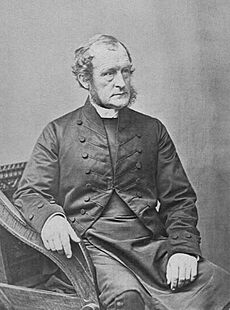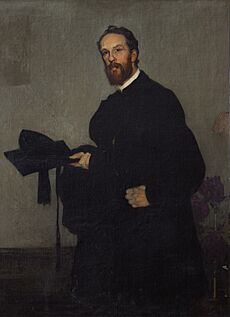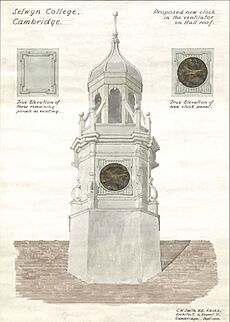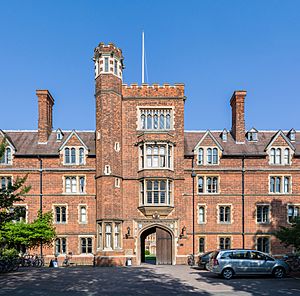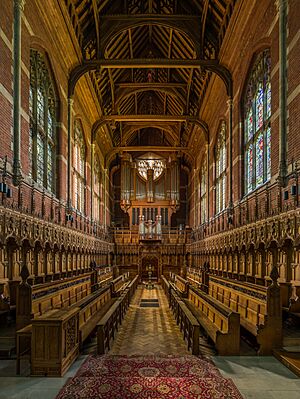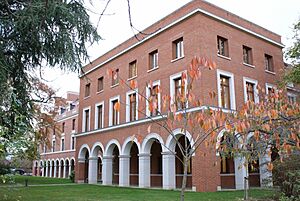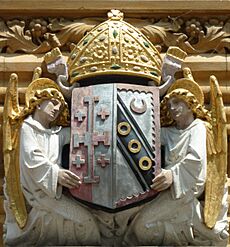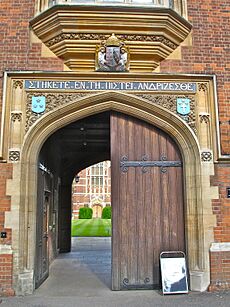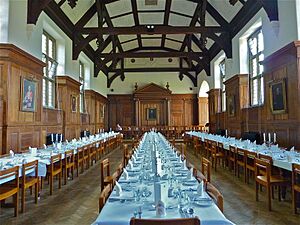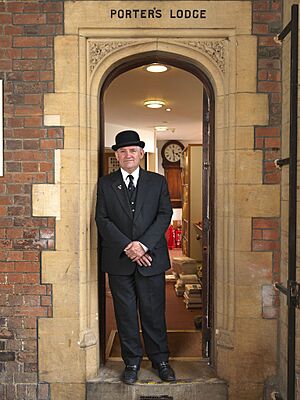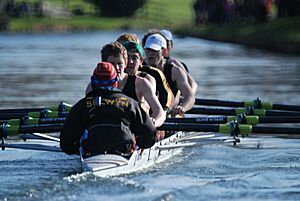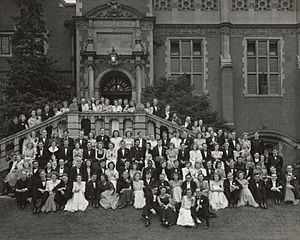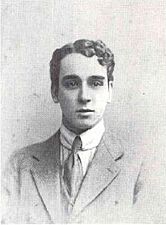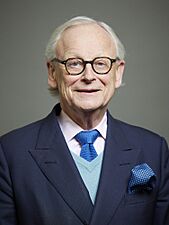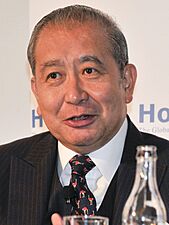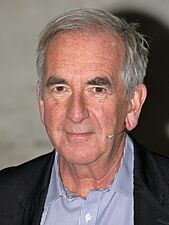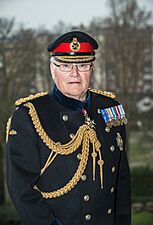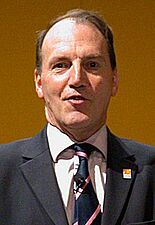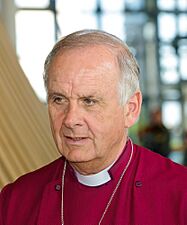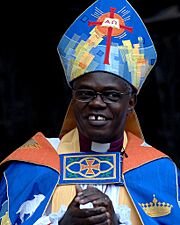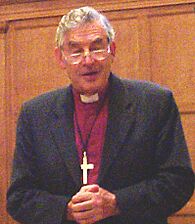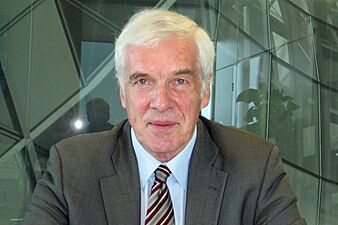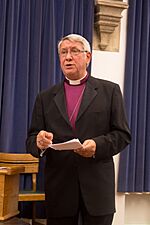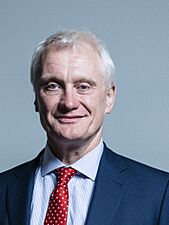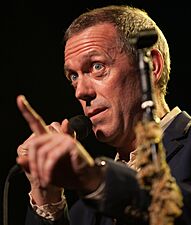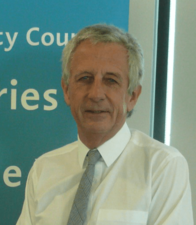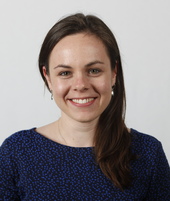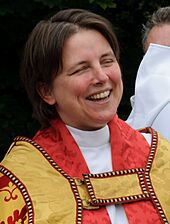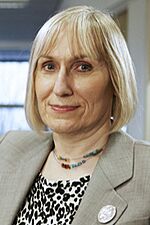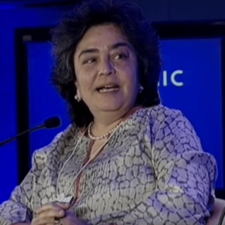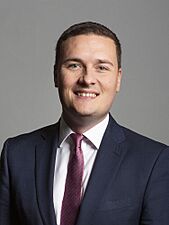Selwyn College, Cambridge facts for kids
Quick facts for kids Selwyn College |
||||||||||||||||
|---|---|---|---|---|---|---|---|---|---|---|---|---|---|---|---|---|
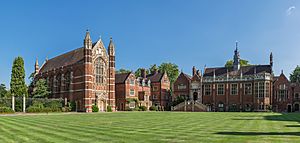
Selwyn College's Old Court
|
||||||||||||||||
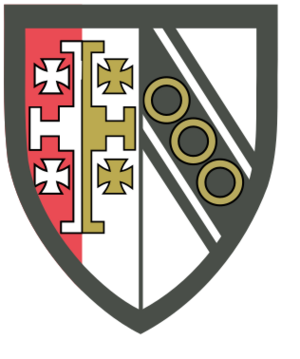
Blazon: see below
|
||||||||||||||||
|
|
||||||||||||||||
| University | University of Cambridge | |||||||||||||||
| Location | Grange Road | |||||||||||||||
| Full name | Selwyn College in the University of Cambridge | |||||||||||||||
| Abbreviation | SE | |||||||||||||||
| Motto | Ανδρίζεσθε | |||||||||||||||
| Motto in English | "Quit ye like men" | |||||||||||||||
| Established | 1882 | |||||||||||||||
| Named after | George Selwyn | |||||||||||||||
| Sister colleges | Keble College, Oxford Benjamin Franklin College, Yale |
|||||||||||||||
| Master | Roger Mosey | |||||||||||||||
| Undergraduates | 443 (2022-23) | |||||||||||||||
| Postgraduates | 307 (2022-23) | |||||||||||||||
| Map | ||||||||||||||||
| Lua error in Module:Location_map at line 420: attempt to index field 'wikibase' (a nil value). | ||||||||||||||||
Selwyn College, Cambridge is a special part of the University of Cambridge. It was started in 1882 to remember a very important person named George Augustus Selwyn. He was a bishop, which is a leader in the church, first in New Zealand and then in England.
The college has three main areas built with stone and brick: Old Court, Ann's Court, and Cripps Court. There are also other buildings nearby that students live in. Selwyn College has about 60 teachers and researchers, called fellows, and 110 other staff members.
In 2024, Selwyn College was ranked fifth among Cambridge colleges for how well its undergraduate students did in their exams. This shows it's a great place to study!
Contents
History of Selwyn College
George Augustus Selwyn's Life
The college was named after George Augustus Selwyn. He was born in 1809 and passed away in 1878. He was a student at St John's College, Cambridge. He even competed in the very first Boat Race in 1829.
After finishing his studies, Selwyn taught at Eton College. He became a priest in the church. In 1841, he was chosen to be the first bishop of New Zealand. He helped set up the church there.
He returned to England in 1867. He then became the Bishop of Lichfield, a role he held until he passed away.
How the College Started
After Bishop Selwyn died in 1878, people in Cambridge wanted to create something to honor him. A group called the Selwyn Memorial Committee decided to build a new college.
The first head of the college, called the Master, was Arthur Lyttelton. He was chosen in 1879. Building started in 1880 on what is now called Old Court.
The first stone of the college was laid on June 1, 1881. Queen Victoria officially approved the college on September 13, 1882. The college officially opened on October 10, 1882. Selwyn College welcomed its first 28 students that year.
Arthur Lyttelton worked hard to make the college strong academically and financially. He came from an important family. His mother was related to the Prime Minister, William Ewart Gladstone. Gladstone became a big supporter of the college. He even gave the college one of its chapel bells. Students still call it 'Gladstone's Bell' today.
The college was built with money from donations. It was founded with a strong religious focus. The original rules said it was for students who wanted an academic education. It also aimed to combine good living and learning with Christian teaching. At first, only baptized Christians could be students. The college also wanted to help those who planned to be missionaries. It also aimed to educate the children of church leaders.
Selwyn was not a full college of the university at first. It was called a "Public Hostel." Students were listed as "H. Selw." on university lists. Education was expensive back then. Selwyn College wanted to be a place for students who couldn't easily afford university. So, the fees were kept low.
Later Changes and Growth
In 1926, Selwyn became an "Approved Foundation." This gave the college more security. The special "H. Selw." listing for students also stopped in 1924.
On March 14, 1958, Selwyn College became a full college of the University of Cambridge.
Like most colleges at Oxford and Cambridge, Selwyn first only accepted men. But it was one of the first colleges to welcome women. Women started studying there in 1976. In 1999, Selwyn hired the first female Director of Music at an Oxford or Cambridge college, Sarah MacDonald. In 2009, Selwyn was the first Cambridge college to have a female head porter, Helen Stephens.
In recent years, the college has become known for helping students from all backgrounds. In 2023, 81% of its students came from state schools. It was also ranked first for exam results in 2024.
College Buildings and Grounds
The college bought about 6 acres of land in 1879. This land is where Old Court and Ann's Court are located. At first, the site seemed far from the city center. But now, Selwyn is right next to the Sidgwick Site. This is where many of the university's arts and humanities departments are.
Old Court Buildings
Old Court started being built in 1880. It is made of stone and red brick. It was designed in a style called Victorian Late Perpendicular Gothic Revival. This court has seven staircases (A–G). It also includes a tower, a gateway, the Master's Lodge, the Chapel, the Dining Hall, and the Kitchens.
The chapel was built in 1895. Attending chapel was required for students until 1935. There were plans for a library in Old Court, but it was never built there. The Selwyn College Library was opened in 1929. It was built to honor college members who died in the First World War.
The Dining Hall was built starting in 1909. It was funded by the fourth Master, Richard Appleton. His initials and a special symbol (three apples and a tun) are on the wall of the Hall entrance. The wood panels on the west side of the hall were added in 1913. They came from an English Church in Rotterdam.
Cripps Court Buildings
Cripps Court is named after the Cripps Foundation. This group gave most of the money to build it. It was opened on May 17, 1969. Cripps Court has a special design with rooms that have their own bathrooms.
Cripps Court has seven more staircases (H–N). All first-year students at Selwyn live here. Some second-year students and graduate students also live here. Graduate students have their own common room, called the Middle Combination Room (MCR).
Ann's Court Buildings
Ann's Court is the newest court. It is built with special golden-yellow stone and brick. This stone has been used in Cambridge colleges for hundreds of years. The inside of Ann's Court is modern with wooden staircases.
Ann's Court was named after Ann Dobson. She and her husband helped pay for its construction. The first part of Ann's Court was finished in 2005. It has 43 rooms with bathrooms and 15 offices. The second part was finished in 2009. It has 40 more rooms and a new Junior Combination Room (JCR). The college bar was also updated in 2002 and 2011.
Future Plans for the College
The college has plans to build more in the future. These plans include a new library and archives. There will also be two more student housing blocks. These will form a new court. An auditorium and conference rooms are also planned.
The new library and auditorium will be near Ann's Court. All future buildings will use the same stone and brick style. These plans will help the college welcome more graduate students. The original library building will be kept and used for lectures.
College Coat of Arms and Motto
The Selwyn College coat of arms combines symbols from the Selwyn family and the Diocese of Lichfield. The college also has an official badge. It shows a golden hat (mitre) inside a purple ring.
Before getting its official coat of arms, Selwyn College used symbols believed to be from George Augustus Selwyn. These are still seen above the main gateway.
The college's motto is a quote from the Bible. It is in Greek: ΑΝΔΡΙΖΕΣΘΕ (andrízesthe). This means "Quit ye like men" or "Be courageous." A longer part of the quote is carved over the main college gate.
College Traditions
Formal Hall Dinners
Selwyn College has special dinners called Formal Hall. They happen every Tuesday and Thursday evening during term time. Students can buy tickets for themselves and up to two guests. There are also special Formal Halls, like Halfway Hall for second-year students. This marks the middle of their time at college. There's also a Christmas Formal at the end of the autumn term.
Formal Halls are for students, teachers, and the Master of the college. Guests from other colleges or outside the university can also attend. These meals have three or four courses. College staff serve the food. Teachers and the Master sit at the High Table. Students sit at long tables.
Latin Grace Prayer
A Latin prayer, called the Grace, is said at the start of Formal Hall. A teacher or a top-performing student says it. It means: "Bless us, O Lord, and all thy gifts, which of thy goodness we are about to enjoy; grant that we may use these generosities to thy glory, and enjoy them with thankful hearts, through Jesus Christ our Lord. Amen."
At the end of the meal, another short Grace is said. The response is "Praise be to God."
Loyal Toast Tradition
Selwyn College has a tradition during Formal Hall. Senior teachers and college members often stay seated for the loyal toast. This is a toast to the King or Queen. This tradition is not meant to be disrespectful. It is to remember a former Master of the college, John Selwyn. He had trouble standing later in his life. John Selwyn was the son of George Augustus Selwyn.
Lecture Series Events
Selwyn College hosts an annual lecture series. It is named after Ramsay Murray, a former student. The Ramsay Murray Lecture Series started in 1994. Many famous politicians, academics, and journalists have given talks. These lectures are free and open to everyone.
Student Life at Selwyn
Selwyn is known for being a friendly college. Students at Selwyn College must wear their gowns for Formal Hall and other college events. The Selwyn gown is black with dark navy blue parts.
Student Common Rooms
The Selwyn College Junior Combination Room (JCR) is like the student union for undergraduate students. Students elect a committee to organize events. They also talk with the college on behalf of students.
The Middle Combination Room (MCR) is for graduate students. It is also run by an elected committee. The MCR is located in Cripps Court. The leaders of the JCR and MCR are part of the College Council. This is the main group that makes decisions for the college.
Student Clubs and Activities
The college has many student groups. These include the Hermes Club and the Selwyn College Music Society. There's also Selwyn Jazz and a drama group called The Mighty Players. Selwyn has the longest-running student magazine of any Cambridge College. It's called Kiwi and has been published since 1982.
The chapel choir is a mixed choir. They sing three services each week during term. They have also traveled and made over 15 music recordings. The choir has included members from the nearby Newnham College for a long time.
Hermes Club for Sports
The Hermes Club started in 1920. Its goal is to support and improve sports at Selwyn College. It gives money to individual athletes and college teams. It also works with the college to raise the profile of sports. Students can join if they have achieved high honors in university sports. They can also join if they have led a Selwyn College team in a top sport.
The club's former members help fund two main sports grant programs.
Selwyn College Boat Club
The Selwyn College Boat Club (SCBC) is the rowing club for students. It was founded in 1882. In its early days, the club trained several rowers who became Olympic rowers. They also competed in the annual Boat Race against Oxford. The SCBC also did well in college competitions. Famous former members include Hugh Laurie and Tom Hollander.
Student Societies
Like many colleges, Selwyn has some student societies. These include The Controversialists and The Templars. Some of these groups are for discussions and debates.
The Controversialists Society
The Controversialists are the oldest society at the college. They started in 1893. The group's name comes from their interest in discussing poetry and literature. The society's goal was "the reading and discussion of English poetry and drama." Both undergraduate and graduate students can join. The group has a limit of twelve members. They usually meet on Sundays. Their symbol is a purple lyre.
The Controversialists often organize events where members read poetry.
The Templars Society
The Selwyn College Templars are said to be the second oldest and largest society. At first, it was only for wealthy students. Members of the Templars were often involved in campus politics. New members are reportedly 'knighted' in a special ceremony.
Winter and May Balls
Selwyn College is special because it holds an annual Winter Ball. It's called the Selwyn Snowball. It usually happens on the last Friday of the autumn term.
The tradition of May Balls at Selwyn started on June 14, 1948. Hundreds of students dressed up for the all-night party. May Balls continued through the second half of the 20th century. The band The Who even performed in 1967. In recent years, the Snowball has mostly replaced the May Balls. However, May Balls were held in 2008, 2015, and 2017.
Notable People from Selwyn College
-
General Sir Peter Wall (Chief of the General Staff)
-
Peter Beckingham (Diplomat and Governor of the Turks and Caicos Islands)
-
Hugh Laurie (actor)
-
Kate Forbes (SNP Member of the Scottish Parliament)
-
Lucy Winkett (Anglican priest)
-
Sophie Wilson (Computing pioneer)
-
Wes Streeting (Secretary of State for Health and Social Care)
| Name | Birth | Death | Career |
|---|---|---|---|
| Wes Streeting | 1983 | Politician | |
| Clive Anderson | 1952 | Comedian and television show host | |
| Christina Baker Kline | 1964 | Novelist | |
| Peter Beckingham | 1949 | Governor of the Turks and Caicos Islands | |
| Richard Budgett | 1959 | 1984 Olympic rowing gold medallist | |
| Ralph Chubb | 1892 | 1960 | Poet and printer |
| Deryck Cooke | 1919 | 1976 | Musicologist and broadcaster |
| Brian Clegg | 1955 | Science author | |
| A. R. Cornelius | 1903 | 1991 | Former Chief Justice of the Supreme Court of Pakistan |
| Huw Davies | 1959 | England Rugby fly-half 1981-86 | |
| Kate Forbes | 1990 | Member of the Scottish Parliament | |
| Viv Groskop | 1973 | Journalist, writer and comedian | |
| John Selwyn Gummer | 1939 | British politician | |
| Peter Selwyn Gummer | 1942 | Businessman | |
| Richard Harries | 1936 | Former Bishop of Oxford and life peer | |
| Robert Harris | 1957 | Author | |
| Tom Hollander | 1967 | Actor | |
| Karl Hudson-Phillips | 1933 | 2014 | Judge |
| Simon Hughes | 1951 | Politician | |
| Peter Matthew Hutton | 1966 | Sports media executive | |
| Grayston "Bill" Ives | 1948 | Composer | |
| Lionel Charles Knights | 1906 | 1997 | Literary critic |
| Robert Lacey | 1944 | Writer and historical advisor to Netflix's The Crown | |
| Hugh Laurie | 1959 | Comedian and actor, son of Ran Laurie | |
| Ran Laurie | 1915 | 1998 | 1948 Olympic rowing gold medallist |
| Andrew Lawrence-King | 1959 | Musician | |
| Sir David Li | 1939 | Chairman and Chief Executive of the Bank of East Asia | |
| Ivan Lloyd-Phillips | 1910 | 1984 | Civil servant |
| Angus Maddison | 1926 | 2010 | Economist |
| Sir Richard May | 1938 | 2004 | Judge |
| David Miller | 1946 | Political theorist | |
| Zia Mody | 1956 | Lawyer | |
| Barry Morgan | 1947 | Archbishop of Wales | |
| Malcolm Muggeridge | 1903 | 1990 | Author and journalist |
| Rob Newman | 1964 | Comedian | |
| Nigel Newton | 1955 | Founder of Bloomsbury Publishing | |
| Sir Edwin Nixon | 1925 | 2008 | Managing director of IBM (UK) |
| Julian Pearce | Bigsby Medal- and Murchison Medal-winning geochemist | ||
| Justine Picardie | 1961 | Novelist and writer | |
| John Saunders | 1953 | Full international-level chess player and chess magazine editor | |
| John Sentamu | 1949 | Archbishop of York | |
| Sir Peter Singer | 1944 | Judge | |
| Adrian Smith | 1957 | Statistician | |
| Peter Smith | 1952 | Judge | |
| Tim Stevens | 1946 | Bishop of Leicester | |
| Graham Stuart | 1962 | British politician | |
| David Thomson | 1957 | Member of Canada's wealthiest family | |
| D. R. Thorpe | 1943 | Political biographer | |
| Peter Wall | 1955 | Professional head of British Army | |
| Stephen Wall | 1947 | Diplomat | |
| George Weightman-Smith | 1905 | 1972 | Olympic athlete |
| Eley Williams | 1986 | Writer | |
| Peter Williams | 1945 | Physicist | |
| Tim Davie | 1967 | Director-General of the BBC | |
| Sophie Wilson | 1957 | Computer scientist | |
| Lucy Winkett | 1968 | Anglican priest |
See also
 In Spanish: Selwyn College para niños
In Spanish: Selwyn College para niños
- List of Masters of Selwyn College, Cambridge
- List of organ scholars
- Selwyn House School
- Listed buildings in Cambridge (west)
 | John T. Biggers |
 | Thomas Blackshear |
 | Mark Bradford |
 | Beverly Buchanan |


